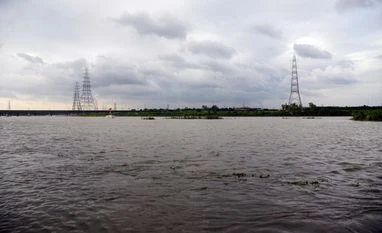The Yamuna inched closer to the warning mark in Delhi as Haryana released more water into the river from the Hathnikund barrage amid persistent rains in the upper catchment areas.
According to a flood bulletin, the water level at the Old Railway Bridge increased from 203.18 metres at 1 pm on Sunday to 203.58 metres at 10 am on Monday. The warning level is 204.5 metres.
The water level is anticipated to rise to 205.5 metres between 10 am and 12 noon on Tuesday, crossing the danger mark of 205.33 metres.
The irrigation and flood control department said the flow rate at the Hathnikund barrage gradually increased from 1,05,453 cusecs at 4 pm on Sunday to 2,54,806 cusecs at 10 am on Monday.
Normally, the flow rate at the barrage is 352 cusecs, but heavy rainfall in the catchment areas increases the discharge. The water from the barrage takes around two to three days to reach Delhi.
The Delhi government issued a flood warning on Sunday and started shifting people living close to the river banks to safer areas.
More From This Section
Authorities have been instructed to stay vigilant and take necessary action in vulnerable areas. Quick response teams and boats have been deployed, according to the department.
The Delhi government has set up 16 control rooms, including a central control room, to monitor the flood-prone areas and the water level of the Yamuna.
Also Read: Waterlogging hits Delhi NCR; all you need to know
Northwest India has seen incessant rainfall over the last three days, with many areas in Jammu and Kashmir, Uttarakhand, Himachal Pradesh, Haryana, Uttar Pradesh and Rajasthan recording "heavy to extremely heavy" precipitation.
This has resulted in overflowing rivers, creeks and drains that have massively damaged infrastructure and disrupted essential services in Jammu and Kashmir, Himachal Pradesh, Uttarakhand and Punjab.
Delhi witnessed its highest rainfall (153 mm) in a single day in July since 1982 in the 24-hour period ending at 8:30 am on Sunday. The city received an additional 107 mm rainfall in the subsequent 24 hours, exacerbating the situation.
The heavy rain transformed roads into gushing streams, parks into watery labyrinths and marketplaces into submerged realms.
In response to the torrential rain, the Delhi government announced a closure of all schools on Monday and cancelled the Sunday leave of government officials, instructing them to be in the field.
The Yamuna river system's catchment covers parts of Uttar Pradesh, Uttarakhand, Himachal Pradesh, Haryana, Rajasthan, Madhya Pradesh and Delhi.
The low-lying areas near the river in Delhi are considered prone to flooding and are inhabited by around 37,000 people.
Encroachments on the river floodplain have occurred over the years, despite the land belonging to the Delhi Development Authority (DDA), revenue department and private individuals.
The river breached the danger mark twice in September last year.
)